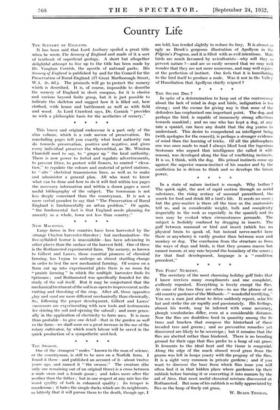NEW MACH I NES.
Large farms in five counties have been harvested by the strange Clayton harvester-thresher ; but mechanization—the five-syllabled horror is unavoidable—has been advancing in other places than the surface of the harvest field. One of these is the Rothamsted experimental farm. The scenery, as known to Gilbert and Lawes, those essential pioneers of chemical farming, has begun to undergo an almost startling change in order to test the new mechanical farming. Of course on a farm cut up into experimental plots there is no room for " prairie farming " in which the multiple harvester finds its optimum ; and Rothamsted was specifically founded for the study of the soil itself. But it may be conjectured that the mechanical treatment of the soil is as open to improvement as the cutting and threshing of the crop. After all, those opposites clay and sand are more different mechanically than chemically. So, following the proper development, Gilbert and Lawes' successors are experimenting with new tools and instruments for stirring the soil and opening the subsoil ; and more gener- ally in the application of electricity to farm uses. It is more than probable—to give one detail—that in the garden as well as the farm—we shall soon see a great increase in the use of the rotary cultivator, by which much labour will be saved in the quick production of a sympathetic seed-bed.






























 Previous page
Previous page